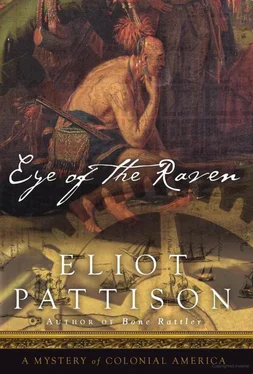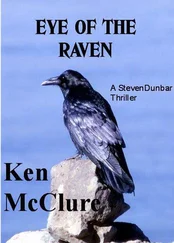Eliot Pattison - Eye of the Raven
Здесь есть возможность читать онлайн «Eliot Pattison - Eye of the Raven» весь текст электронной книги совершенно бесплатно (целиком полную версию без сокращений). В некоторых случаях можно слушать аудио, скачать через торрент в формате fb2 и присутствует краткое содержание. Год выпуска: 2010, ISBN: 2010, Издательство: Counterpoint Press, Жанр: Исторический детектив, на английском языке. Описание произведения, (предисловие) а так же отзывы посетителей доступны на портале библиотеки ЛибКат.
- Название:Eye of the Raven
- Автор:
- Издательство:Counterpoint Press
- Жанр:
- Год:2010
- ISBN:9781582437019
- Рейтинг книги:5 / 5. Голосов: 1
-
Избранное:Добавить в избранное
- Отзывы:
-
Ваша оценка:
- 100
- 1
- 2
- 3
- 4
- 5
Eye of the Raven: краткое содержание, описание и аннотация
Предлагаем к чтению аннотацию, описание, краткое содержание или предисловие (зависит от того, что написал сам автор книги «Eye of the Raven»). Если вы не нашли необходимую информацию о книге — напишите в комментариях, мы постараемся отыскать её.
Eye of the Raven — читать онлайн бесплатно полную книгу (весь текст) целиком
Ниже представлен текст книги, разбитый по страницам. Система сохранения места последней прочитанной страницы, позволяет с удобством читать онлайн бесплатно книгу «Eye of the Raven», без необходимости каждый раз заново искать на чём Вы остановились. Поставьте закладку, и сможете в любой момент перейти на страницу, на которой закончили чтение.
Интервал:
Закладка:
Conawago had never learned to swim. He had told Duncan that his spirit protector was a creature of land, as if it excused him. As Duncan swam he could not see his friend through the clear river water, could only see one of the many deep holes that pockmarked the bottom of the Susquehanna. He surfaced, gulped more air, and dove again. Downward he went, deep, into the hole, flipping his legs like the seals he had swum with as a boy, down until the light began to fade. Then finally Conawago was there, not trying to swim, his arms extended as if to embrace someone, his eyes open and puzzled as he hung suspended in the murk.
Duncan emerged coughing, with barely strength enough to drag his friend's body onto the pebble shore, frantic that he could see no movement in Conawago's chest. He turned him over and pounded his back, wondering at the strange voice beside him until he realized that the desperate prayer in Iroquois was coming from his own mouth.
Then suddenly, miraculously, the old man was coughing, spitting up great quantities of water, and there were feet running on the pebbles, hands reaching down for them as Duncan collapsed onto the beach.
He awoke under a stack of blankets on a cot set next to a blazing fireplace, basking in dull, splendid warmth.
"God's bones, McCallum, you both nearly died." Van Grut handed him a steaming mug.
"Conawago-"
"Is just beyond the door, drying in the sun."
Duncan sat up, sipping the mug. It was not tea but a beefy broth. He drank half then quickly surveyed his surroundings. He was in a spare but comfortable room. The split log that served as fireplace mantel held a small wooden cross, a Bible lay on a plank table surrounded by rough-hewn benches. The needlepoint sampler hung by the door spelled out a blessing in German. From one of the two partially closed doors behind him wafted the smell of baking bread.
"Moravians?" Duncan asked as he drained his mug, referring to the German missionaries who often lived among the Indians of Pennsylvania.
As if in answer a girl with two blond braids stepped into the house, accompanied by two Indian children, a boy and a girl. All three carried small writing slates, covered with chalked words from the Bible in English and German.
The children watched in apparent fascination as Duncan swung his legs onto the floor. The boy wiped his slate clean and began working with a piece of chalk.
"Did you see who did this?" he asked Van Grut, rubbing his throbbing head.
"Greta-" the Dutchman nodded toward the blond girl, — saw Conawago running into the water, shouting in fear, and ran for us as we sat with her parents. We saw you lying limp, adrift on the log, and realized he had gone to rescue you."
"He can't swim," Duncan said, shuddering at the memory of his friend suspended as if dead in the clear river water.
"But you!" the Dutchman exclaimed. "You were like a beast bred in the water."
"I nearly was," Duncan absently said as he stepped to the doorway, checking his clothes. The small pouch that usually hung from his belt was gone, and with it the evidence taken from the murders. "We were a clan of the islands." He could see Conawago now, sitting cross-legged on a flat ledge stone jutting over the broad river.
"Do you suppose I could get another?" he asked, extending his mug toward Van Grut. He found himself shivering. The cold of the water had seeped into his bones.
"The kitchens of the Dutch and Germans overflow with warm concoctions," Van Grut replied with a smile, and he disappeared behind the door nearest the fireplace.
Duncan turned to Greta. "You brought our rescuers," he offered in a grateful tone.
"We prayed for your deliverance," came the reply, not from Greta but from the native girl beside her.
The boy held up his slate. At the top he had drawn an image of a great fish spewing up two men. Duncan studied the trio. The Indian children were as well-groomed, as well-fed, as the German girl.
"God watched over us as he did Jonah," Duncan agreed, then watched as the boy covered the fish with his hand, showing another image at the bottom, a series of concentric circles.
The boy, apparently lacking the language skills of his sister, pointed meaningfully to the strange circles. "Lenni-Lenape," he said, then repeated the words, the native term for the Delaware Indians. Duncan was about to press the two girls to explain when Van Grut returned with another steaming mug, announcing that a meal would soon be served.
Duncan took the nourishing broth outside and sat beside Conawago. "Thank you," he said.
"I was an old fool," Conawago muttered. "Nearly got us both killed."
The river had harrowed him to the core. Duncan had never seen his companion so pale, never heard before this hollow tone in his voice. He remained silent a long time, watching a flight of geese, staring at the living, rippling water of the mighty river, worrying with all his heart about the old Indian. "The cold of the deep water is like no other," he said. "I've seen it affect people in many strange ways."
Conawago did not reply, nor did he react when Duncan set the hot mug on his leg and wrapped his fingers around it. "Drink. Please."
After a moment the old Nipmuc abruptly looked down at the mug, as if he had not heard the words, only sensed its heat.
"You need to push the chill from your belly," Duncan urged, and finally Conawago complied, sipping at first, then quickly draining the contents down his throat.
Duncan watched with relief as the color slowly returned to Conawago's cheeks. "Did you see who put me on the log?"
"Just their backs. Two bucks, one with an eagle feather dangling in his braid, the other with red leggings with tattoos on his back."
"You saw them carry me from Rideaux's compound?"
"No. I was behind it, circling it, trying to understand it. I have never seen such a place."
"Nor I," Duncan agreed, and he quickly described the clockwork creature he had found.
"It was meant to be a bear?"
"More like an amalgam of many forest creatures, or a symbol of all."
"Or the mother spirit of the forest."
"Yes," Duncan said slowly. There had been benches facing it, as if the thing were an altar. He explained finding gears on the table, in addition to those in the machine. "In all the vast wilderness," he pondered aloud, "where else could a killer find such gears?"
"With all the vast wilderness," Conawago said, as if to correct him, "why would the killer trouble to find such gears?"
The ring of a small bell broke their troubled silence.
The dining table had been carried outside and extended with planks to accommodate not only the four visitors but also six Indian schoolchildren and four of their parents, including a somber middle-aged Onondaga named Moses, who led them in a long prayer before the bread was broken. Duncan suddenly found himself famished, but had difficulty keeping up with Hadley and Van Grut, as the good-natured German matron replenished their plates. The shad were running up the river, and the tasty fish, fried in cornmeal, seemed in limitless supply.
Duncan made polite inquiries of Reverend Macklin, their host, about the history of the mission and the sprawling settlement of Shamokin that was, he learned, the second-biggest community in the region after Philadelphia. The most cosmopolitan of Indian towns, it was home to a dozen different tribes, as well as European settlers, trappers, and merchants. An enterprising Welshman had set up a business employing Indians to make baskets and brooms for shipment to the European settlements, and a German settler had hired several others to harvest and dry the shad, which, split and salted, could be seen drying on long racks along the long curving bank of the river.
"You have the town well organized, it seems," Van Grut observed to the missionary.
Читать дальшеИнтервал:
Закладка:
Похожие книги на «Eye of the Raven»
Представляем Вашему вниманию похожие книги на «Eye of the Raven» списком для выбора. Мы отобрали схожую по названию и смыслу литературу в надежде предоставить читателям больше вариантов отыскать новые, интересные, ещё непрочитанные произведения.
Обсуждение, отзывы о книге «Eye of the Raven» и просто собственные мнения читателей. Оставьте ваши комментарии, напишите, что Вы думаете о произведении, его смысле или главных героях. Укажите что конкретно понравилось, а что нет, и почему Вы так считаете.












